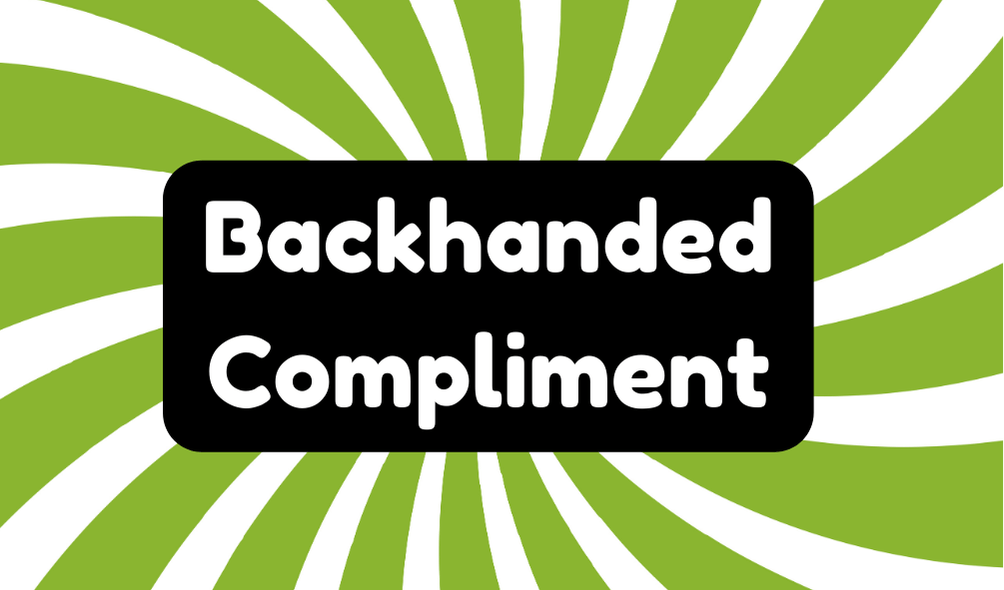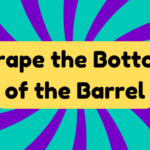A backhanded compliment mixes praise with a hint of criticism, like saying, "You're really good at this, for someone who just started." The term comes from "left-handed compliment," linked to the Latin word "sinistra," meaning sinister, reflecting cultural biases against left-handedness. Often, these comments mask true intentions, creating misinterpretations and confusion. Common examples include phrases like, "You look great for your age," which can feel demeaning. Understanding backhanded compliments is essential in today's communication to avoid potential misunderstandings. By being aware of these nuances, you can enhance your social skills and improve your interactions. There's much more to explore on this topic.
Synonyms
When it comes to understanding backhanded compliments, knowing the synonyms can enhance your grasp of the concept. These terms point to the subtle sarcasm often embedded in ambiguous praise, helping you navigate social interactions more effectively. Here are a few synonyms that capture this essence:
- Left-handed compliment
- Ironical praise
- Insincere flattery
Recognizing these terms isn't merely a vocabulary exercise; it's about understanding communication's complexities. Backhanded compliments subtly mix approval with criticism, leaving you uncertain about the true message. Without awareness of their synonyms, you might misinterpret intentions—leading to confusion in your conversations. Cultivating this awareness can guide you in decoding the layered meanings behind seemingly positive remarks and enhance your social acumen.
Example of Sentences
Backhanded compliments often leave you questioning the true intent behind someone's words. You might want to pay attention to how these subtle forms of communication play out in social dynamics. Here are a few examples to illustrate:
- "You're surprisingly good at your job for someone with such a laid-back attitude."
- "That outfit really works for you, even if it's not your usual style."
- "I didn't expect you to pull off that project so well, given your past."
Recognizing these sentences can help you navigate conversations more effectively. They may seem like praise, but often hide criticism or doubt. By staying aware, you'll sharpen your skills for interpreting intentions and maintaining solid relationships.
Origin
Ever wondered where the term "backhanded compliment" comes from? This intriguing phrase, often linked to the idea of a "left-handed compliment," has roots in the Latin word "sinistra," meaning sinister. Historically, left-handedness was viewed negatively, while the right hand symbolized positivity. Curiously, cultural implications emerge in various communication styles worldwide.
Here's a breakdown of its origin:
| Aspect | Description |
|---|---|
| Language Origin | Derived from Latin "sinistra" |
| Cultural Context | Left-handedness seen as unlucky |
| Positive Association | Right hand linked to favorable actions |
Hence, when you offer a backhanded compliment, you're tapping into a complex history that reflects social and cultural dynamics.
Collocations
Some phrases often accompany backhanded compliments, enriching their meaning and impact. You might notice how language like this layers subtle sarcasm on top of ambiguous expressions. When you hear a backhanded compliment, it's often dressed up in certain common collocations:
- "It's surprising how well you did"
- "You look good, for your age"
- "That's a unique choice"
These phrases may seem innocent at first glance, but they pack a punch, blending praise with veiled criticism. By employing this type of language, individuals may unintentionally reveal their true feelings, leaving you questioning their intent. Understanding these collocations can empower you to navigate social interactions more effectively, allowing you to discern when compliments truly reflect admiration rather than hidden disdain.
How to Use in Everyday Language
Using backhanded compliments in everyday language can add a layer of humor or sarcasm to interactions, but it's important to use them wisely. While they can spark laughter, they can also confuse or offend. To navigate social dynamics, make certain your tone matches the context. For instance, if you're joking with friends who appreciate subtle humor, a cheeky remark might land well. However, be cautious in professional settings, as misunderstandings can harm relationships. Remember, the intent behind these compliments is vital; if misinterpreted, they could undermine your message. Prioritize clarity and respect, and think twice before dropping a witty remark. When used thoughtfully, backhanded compliments can become memorable conversational tools.
Why Is It Still Relevant Today?
Many people find backhanded compliments relevant today because they reflect the complexities of human communication. These unique expressions highlight cultural significance, revealing how social dynamics can shape interactions. As we navigate varied environments, understanding backhanded compliments can improve our communication.
| Cultural Perspective | Social Dynamics |
|---|---|
| Subtle critique in praise | Reflects competition in groups |
| Humor in sarcasm | Indicates familiarity or closeness |
| Challenges in interpretation | Signals power dynamics |
| Influences on relationships | Can foster or hinder connection |
| Awareness of intent | Shapes responses and feelings |
Recognizing their relevance can help you decode intentions and enhance communication skills. In a world where clarity is often lacking, being aware of these nuances is essential.







